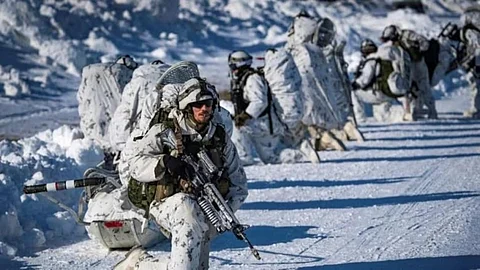

Prime Minister Justin Trudeau’s Liberals have designated Iqaluit, NU, Inuvik, NWT, and Yellowknife, NWT, as sites for Canada’s first three Arctic military “support hubs.”
Notably, these hubs are not military bases, which Conservative leader Pierre Poilievre pledges to build if he wins the next election. Instead, they will exist to support military operations through “communications and transport infrastructure” and by providing “secure storage for supplies,” said the Department of National Defence.
Defence Minister Bill Blair made the announcement revealing the Canadian Arctic security strategy’s “first Northern operational support hub locations” for the Canadian Armed Forces (CAF) on Thursday in Iqaluit.
“These will increase CAF’s presence and responsiveness across the Arctic and the North,” says a press release from the Government of Canada.
The announcement is part of Canada’s 2024 Our North, Strong and Free initiative, described by the feds as a “renewed vision for defence.”
The program includes spending $2.67 billion over 20 years to establish “a network” of these Northern operational support hubs. Each hub will have its own airstrips, logistics facilities, and equipment with an aim to function as a “dispersed network of logistical stations.”
The Liberals' Our North, Strong and Free plan also includes $8.1 billion in new defence spending over five years and $73 billion over 20 years “on an accrual basis to bolster the defence of Canada.”
Part One of Poilievre's Artic plan includes building the first permanent Arctic base since the Cold War in Iqaluit, two extra heavy icebreakers for the Navy and 2000 more Canadian Rangers, said Poilievre on February 10.
"To take back control of Canada’s North and counter the growing threats to Canadian sovereignty and security from adversaries like China and Russia," he said.
He promised to double the size of the 1st Patrol Group of the Canadian Rangers, acquire two additional polar icebreakers for the Royal Canadian Navy, committed to delivering the two polar icebreakers for the coast guard by 2029 (the Liberals would not provide a timeline for readying the icebreakers) and build at least one permanent Arctic military base within two years.
The outgoing Trudeau Liberals' 20-year plan is focused on extending CAF’s operational reach, increasing military presence in the Arctic and “will enable CAF to better assert Canadian sovereignty and support greater year-round presence.”
The NATO target for defence spending is 2% of GDP, which was supposed to be in effect already, though Canada falls cringingly short, and has been reprimanded by other leaders, most prominently President Donald Trump, for failing to meet them.
“This initiative represents a new way of approaching defence and sustainment in the Arctic and the North and will help keep Canadians safe and secure in the face of dramatic changes in our physical and security environment,” states the press release.
Blair said the plan provides critical infrastructure for the CAF to “enhance its presence and responsiveness across the Arctic and the North.”
“It marks significant progress in the Northern Operational Support Hub initiative and advances our commitment to working hand-in-hand with federal partners, the provinces and territories, indigenous peoples, and Northern communities to enhance the Canadian Armed Forces’ footprint in the Canadian Arctic,” he said.
